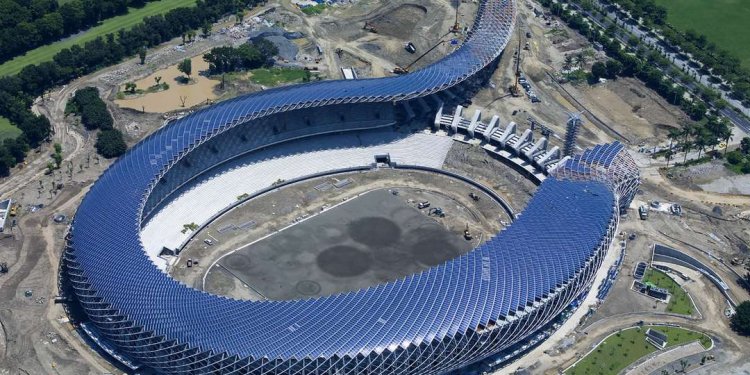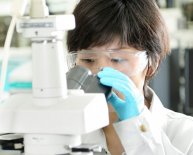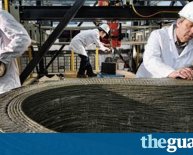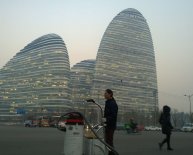
New materials in construction
 This is a checking tunneling microscopic picture associated with the quasicrystalline network accumulated with europium atoms associated with para-quaterphenyl-dicarbonitrile.
This is a checking tunneling microscopic picture associated with the quasicrystalline network accumulated with europium atoms associated with para-quaterphenyl-dicarbonitrile.
Credit: J. I. Urgel / TUM
Unlike traditional crystals, quasicrystals usually do not comprise regular products, although they do have a superordinate structure. The formation of the interesting mosaics which they produce is scarcely understood. In framework of a worldwide collaborative work, scientists in the Technical University of Munich (TUM) have provided a methodology which allows producing two-dimensional quasicrystals from metal-organic companies, opening the doorway toward improvement promising brand-new materials.
Physicist Daniel Shechtman merely pay three concern markings in his laboratory journal, as he saw the outcomes of their latest research one-day in 1982. He had been taking a look at a crystalline structure which was considered impossible at the time. In line with the canonical tenet regarding the time, crystals always had alleged translational balance. They make up just one basic product, the alleged elemental mobile, that's repeated into the exact same form in every spatial instructions.
Although Shechtman's structure performed consist of international balance, the in-patient building blocks cannot be mapped onto each other simply by interpretation. 1st quasicrystal was indeed found. Despite partially stark criticism by reputable peers, Shechtman endured quickly by their new concept and thus revolutionized the scientific comprehension of crystals and solid systems. Last year he fundamentally got the Nobel reward in Chemistry. Even today, both the standard problems and components in which these interesting frameworks are created stay mostly shrouded in mystery.
A toolbox for quasicrystals
Now a team of scientists led by Wilhelm Auwärter and Johannes Barth, both teachers within the division of Surface Physics at TU Munich, in collaboration with Hong Kong University of Science and Technology (HKUST, Prof. Nian Lin, et al) in addition to Spanish analysis institute IMDEA Nanoscience (Dr. David Écija), are suffering from an innovative new basis for making two-dimensional quasicrystals, which might deliver them a good deal nearer to understanding these strange habits.
The TUM doctoral applicant José Ignacio Urgel made the pioneering measurements during a study fellowship at HKUST. "we've got a brand new set of building blocks that individuals may use to gather a lot of different new quasicrystalline frameworks. This variety permits us to investigate as to how quasicrystals tend to be formed, " explain the TUM physicists.
The scientists had been successful in linking europium - a metal atom inside lanthanide sets - with organic compounds, therefore making a two-dimensional quasicrystal that even has the potential to-be extended into a three-dimensional quasicrystal. Currently, boffins have been able to produce numerous periodic and in component highly complex structures from metal-organic sites, but never a quasicrystal.
The scientists were additionally in a position to completely elucidate the newest community geometry in unparalleled resolution making use of a checking tunnelling microscope. They discovered a mosaic of four different standard elements comprising triangles and rectangles distributed irregularly on a substrate. A few of these basic elements put together by themselves to regular dodecagons that, but can't be mapped onto one another through synchronous translation. The effect is a complex structure, a small thing of beauty at atomic degree with dodecagonal symmetry.
Interesting optical and magnetized properties
Within their future work, the researchers are intending to vary the interactions amongst the steel facilities therefore the connected compounds utilizing computer simulation and experiments so that you can understand the conditions under which two-dimensional quasicrystals form. This insight could facilitate tomorrow improvement brand-new tailored quasicrystalline layers.
These kinds of products hold great guarantee. All things considered, the latest metal-organic quasicrystalline companies might have properties that make them interesting in a wide variety of application. "We have found an innovative new playing area where we can not only investigate quasicrystallinity, and develop new functionalities, particularly in the fields of optics and magnetism, " claims Dr. David Écija of IMDEA Nanoscience.
For one, scientists could 1 day use the brand-new methodology to generate quasicrystalline coatings that impact photons in such a manner that they're sent better or that only certain wavelengths can go through the material.
Furthermore, the interactions of lanthanide building blocks inside brand-new quasicrystals could facilitate the development of magnetized systems with really unique properties, so-called "frustrated methods." Here, the in-patient atoms in a crystalline grid interfere with each other in a manner that stops grid points from attaining a minimal energy condition. The effect: exotic magnetized floor states which can be investigated as information stores for future quantum computers.
Story Source:
Materials given by Specialized University of Munich (TUM). Note: information can be edited for style and length.
Journal Guide:
- José I. Urgel, David Écija, Guoqing Lyu, Went Zhang, Carlos-Andres Palma, Willi Auwärter, Nian Lin, Johannes V. Barth. Quasicrystallinity expressed in two-dimensional control networks. Nature Chemistry, 2016; 8 (7): 657 DOI: 10.1038/nchem.2507
Cite This Page:
Specialized University of Munich (TUM). "brand new products for construction of metal-organic 2-dimensional quasicrystals." ScienceDaily. ScienceDaily, 13 July 2016. .
Technical University of Munich (TUM). (2016, July 13). New materials for building of metal-organic 2-dimensional quasicrystals. ScienceDaily. Retrieved October 6, 2016 from
Specialized University of Munich (TUM). "brand new materials for building of metal-organic 2-dimensional quasicrystals." ScienceDaily. (accessed October 6, 2016).

















